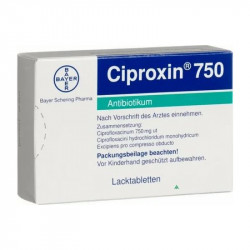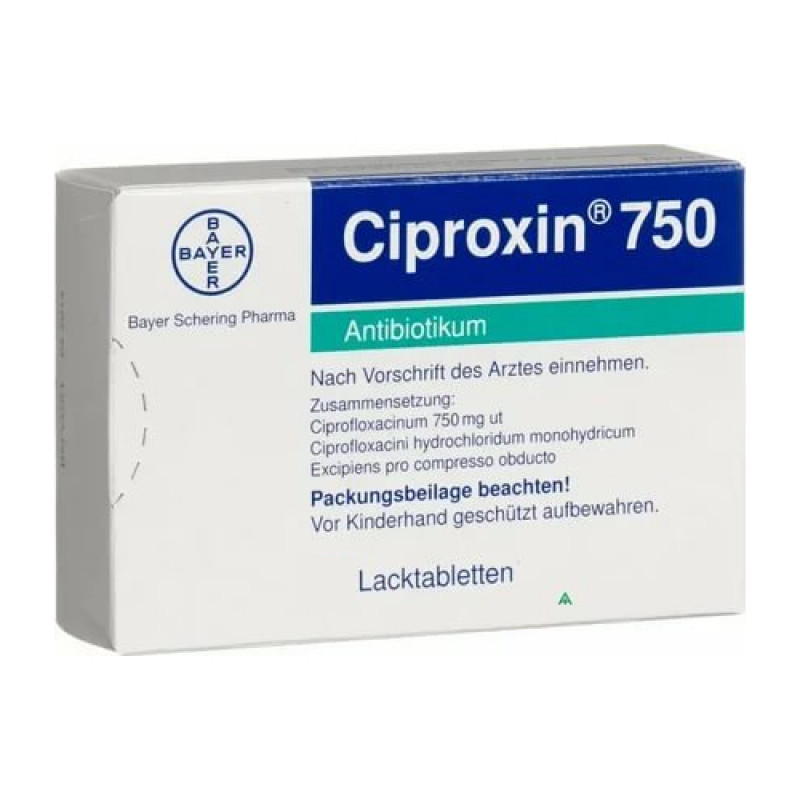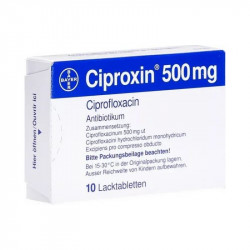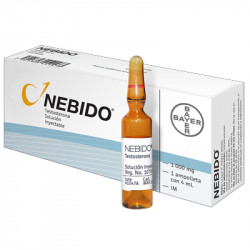
Temporarily, the International Warehouse 2 can ship to USA ONLY. DO NOT PLACE ORDERS IF YOU ARE BASED IN OTHER COUNTRY!
Thank you for understanding,
OSGear Team
Ciproxin 750 - Bayer
CLASSIFICATION Antibiotic, Fluoroquinolone
ACNE No
WATER RETENTION No
HBR No
HEPATOTOXICITY Low
AROMATIZATION No
MANUFACTURER Bayer
WAREHOUSE International Warehouse 2
SUBSTANCE
Ciprofloxacin,

Ciproxin 750
Ciprofloxacin is a fluoroquinolone (flor-o-KWIN-o-lone) antibiotic that fights bacteria in the body. It is used to treat different types of bacterial infections, including skin infections, bone and joint infections, respiratory or sinus infections, urinary tract infections, and certain types of diarrhea. It is also used to treat gonorrhea.
Ciprofloxacin is also used to treat people who have been exposed to anthrax or certain types of plague.
Ciprofloxacin should be used only for infections that cannot be treated with a safer antibiotic.
Fluoroquinolone antibiotics can cause serious or disabling side effects that may not be reversible, such as tendon rupture or nerve problems.
Important Information
Ciprofloxacin can cause serious side effects, including tendon problems, nerve damage, serious mood or behavior changes, or low blood sugar.
Stop using this medicine and call your doctor at once if you have symptoms such as: headache, hunger, irritability, numbness, tingling, burning pain, confusion, agitation, paranoia, problems with memory or concentration, thoughts of suicide, or sudden pain or movement problems in any of your joints.
In rare cases, ciprofloxacin may cause damage to your aorta, which could lead to dangerous bleeding or death. Get emergency medical help if you have severe and constant pain in your chest, stomach, or back.
You may not be able to use ciprofloxacin if you have a muscle disorder. Tell your doctor if you have a history of myasthenia gravis.
Before taking this medicine
You should not use ciprofloxacin if you are allergic to it, or if:
you also take tizanidine; or
you are allergic to other fluoroquinolones (gemifloxacin, levofloxacin, moxifloxacin, norfloxacin, ofloxacin, and others).
you also take theophylline
Ciprofloxacin may cause swelling or tearing of a tendon (the fiber that connects bones to muscles in the body), especially in the Achilles' tendon of the heel. This can happen during treatment or up to several months after you stop taking this medicine. Tendon problems may be more likely in certain people (children and older adults, or people who use steroid medicine or have had an organ transplant).
To make sure this medicine is safe for you, tell your doctor if you have ever had:
tendon problems, bone problems, arthritis, or other joint problems (especially in children);
blood circulation problems, aneurysm, narrowing or hardening of the arteries;
heart problems, high blood pressure;
a genetic disease such as Marfan syndrome or Ehler's-Danlos syndrome;
diabetes;
a muscle or nerve disorder, such as myasthenia gravis;
kidney disease;
seizures or epilepsy;
a head injury or brain tumor;
long QT syndrome (in you or a family member); or
low levels of potassium in your blood (hypokalemia).
Do not give this medicine to a child without medical advice.
It is not known whether this medicine will harm an unborn baby. Tell your doctor if you are pregnant.
You should not breast-feed while using this medicine.
How should I take ciprofloxacin?
Take ciprofloxacin exactly as prescribed by your doctor. Follow all directions on your prescription label and read all medication guides or instruction sheets.
You may take ciprofloxacin with or without food, at the same time each day.
Swallow the extended-release tablet whole and do not crush, chew, or break it.
Use ciprofloxacin for the full prescribed length of time, even if your symptoms quickly improve. Skipping doses can increase your risk of infection that is resistant to medication. This medicine will not treat a viral infection such as the flu or a common cold.
Do not share ciprofloxacin with another person.
Store at room temperature away from moisture and heat.








